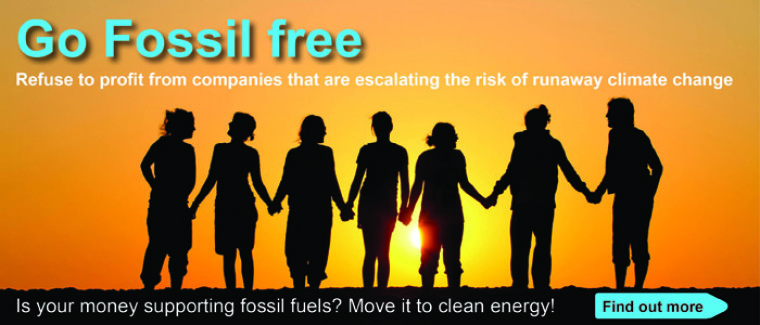
Most fund managers, banks and super-funds will assure their clients that they are socially responsible investors, but few acknowledge that the common understanding of what this means has become outdated.
In 2012 the Carbon Tracker Initiative published its groundbreaking analysis of how much carbon pollution the atmosphere can carry before breaching the accepted threshold of a 2°C average global temperature rise. The maximum we can emit is 565 Gigatonnes of CO2. The total proven reserves owned by companies and governments is already equivalent to 2,795 Gigatonnes, or five times as much! If we stay on the present path and fail to turn decisively away from our fossil fuel dependency, this "carbon budget" will be used up in just 15 years.. Since we can't suddenly stop at that point, we must start reducing consumption immediately!
Mining companies are intent, however, on continuing with business as usual; indeed they are exploring for ever more coal, oil and gas. Therefore, most mining companies fund climate denial think-tanks and actively lobby against legislation that supports the large-scale take-up of renewables.
Yet very few funds managers, banks and super funds are inclined to remove their money from investment in fossil fuel extraction and instead invest it in sustainable alternatives. When challenged, they cite concerns about reduced returns. However, recent research by The Australia Institute suggests that "screening out fossil fuel extraction and downstream industries can have negligible impact on risk-adjusted returns." This confirms a large body of research overseas.
350.org has spearheaded a growing global movement to influence investors to screen out fossil fuels along with other socially unacceptable options. Many cities, philanthropic foundations and universities have resolved to align their investments with their values. World-wide, around seventy-five religious organisations have already joined them.
The Australian Religious Response to Climate Change is challenging religious investors in Australia to do the same. Will religious trustees be among the first to refuse to profit from activities that are destroying the earth, or will they be among the last? Will the values of compassion, justice, peace and stewardship of Creation translate into the way money is invested? Or will it align with an over-simplified interpretation of fiduciary duty, ie, maximizing short-term financial returns (but risking the longer-term returns as others remove their investments)?
Of course there are practical challenges. For anyone interested in working out how this is done in practice, see the resources at ARRCC website for individuals and for organisations. A webinar will also be hosted on Wednesday, May 15th at either 2 pm or 7.30 pm. E-mail chair@arrcc.org.au for details of how to join in.